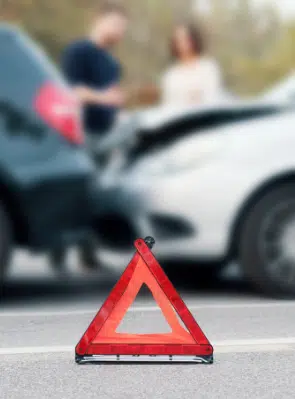Suffered Serious Injuries from a Car Crash and Unsure What to Do Next?
Call An Experienced Louisville Car Accident Attorney for Help Getting Your Maximum Compensation Today!

After a car crash, you deserve to be compensated fairly for the damage done to you and your property. The big problem, though, is this: how do you determine what “fairly” really means?
Calculating this amount, and then actually getting it, is not as easy as some may make it seem. Some damages, like future medical expenses, may be difficult to estimate. Other damages, like emotional anguish, can be highly subjective depending on who you talk to. Blame for the accident itself may not be totally clear, either.
All these factors and more can make calculating car accident settlements complicated, frustrating, and often more work than anticipated for those without experience. And the insurance company you’re negotiating against won’t hesitate to take advantage of that inexperience.
That’s why it is important to hire an experienced personal injury attorney to help you as soon as possible. Experienced car accident attorneys, like those at Karl Truman Law, not only understand how to calculate what your case is truly worth, but also how to present your case in a compelling way to maximize what an insurance company is willing to offer to settle—or, if the case goes to trial, what a jury will award.
In this article, we will cover how settlement values are calculated, including the types of damages that may apply, how negligence factors into the equation, and why the ultimate amount you can recover isn’t always the same as your calculated damages.


Car accident settlements can range from a few thousand dollars to millions. No two cases are exactly alike; the circumstances of the crash itself, the nature of the injuries, and the impact they have on an injured person’s life will always be unique.
For these and other reasons, the idea of an “average” settlement isn’t particularly useful. Your case may be worth significantly more or significantly less, based on any number of factors. This also means that automated tools, like online settlement calculators, are not only unreliable but potentially dangerous for claimants who rely on them while filing a claim.
Calculating damages accurately requires a human perspective. Unfortunately, it can also become extremely complicated and often overwhelming for accident victims, especially as they recover from serious injuries. This makes hiring an experienced personal injury lawyer all the more important.
By hiring an experienced attorney, you can ensure that you are not missing any details that could get you the fair compensation you deserve. An attorney can also save you from overvaluing your claim and risking unnecessary delays or denials. Personal injury lawyers know how to identify potential sources of insurance coverage and calculate damages you may not even consider, helping you maximize your financial recovery.
To calculate the value of any car accident claim, one must consider the types of damages the injured person is eligible to receive and total their combined value.
However, many of these damages are not exactly black and white when it comes to their exact value. While some require only simple addition (like medical bills you’ve already received), others are much more subjective and difficult to estimate.
Broadly speaking, these are the categories of damages that may apply to car accidents:
Out of the three types of damages, economic damages are usually the easiest to calculate and understand. Economic damages have direct financial impacts that are easy to track and often already have an exact number associated with them. However, some economic damages require understanding and estimating future costs and lost potential, which can be difficult to understand without any experience.
Some examples of economic damages include:
Economic damages are calculated by adding up the total cost of these bills and expenses. However, to calculate lost earning potential and future medical costs, your attorney may bring in doctors, financial experts, and other expert witnesses to provide accurate estimates.
Economic damages can vary based on each individual’s financial and personal situation, so it is important to carefully consider all the evidence while calculating. For example, a young adult with a high-wage career may be able to claim much more in lost earning potential than a worker close to retirement age.
Non-economic damages are much more subjective than economic damages. These damages, such as pain and suffering, vary depending on the direct impact of the car accident and resulting injuries upon the victim and their loved ones.
Examples of non-economic damages include:
While there may not be specific medical bills or financial costs associated with non-economic damages, victims still deserve to be compensated for them. The tricky part is figuring out how much.
Since non-economic damages are so subjective, it is important to get help from an experienced attorney. While calculating an exact amount of non-economic damages, any over or undervaluation may cost you your settlement, or keep you from getting the full amount you deserve. Personal injury attorneys are experienced in calculating non-economic damages and can help ensure your settlement’s value is accurate and fair.
Punitive damages are reserved for extreme cases of gross negligence. Gross negligence is conscious reckless behavior that results in severe and often deadly accidents.
Unlike economic and non-economic damages, punitive damages are meant to punish those involved and discourage future reckless behavior, rather than to make whole an accident victim for the pain they’ve suffered. You might think of them as payments that go “above and beyond” fair compensation.
Punitive damages are awarded relatively rarely, as the burden of proof for gross negligence is quite high. Check with your attorney before pursuing punitive damages to help determine whether they might apply in your car accident case.


No matter how accurately you calculate the total value of your damages, it will all be for nothing if you can’t prove that someone else is responsible to pay for them. In the case of car accident settlements, typically this means that you must prove the other driver was negligent.
There are certain expectations that are set for how individuals and businesses operate to keep others safe. If these standards are broken, then it can be considered negligence.
The idea of negligence is easy to oversimplify, but it has a specific legal definition. It is important to make sure the other driver (or any other potentially liable parties, like a trucking company that employs the driver) is truly negligent before making a claim or filing a personal injury lawsuit.
Each of the following elements must be present to ensure the other driver’s actions meet the definition of negligence:
When identifying negligence, be sure to consider any party who may have had a role in causing your car accident. For example, if you are injured by a driver operating a company vehicle, there may be multiple instances of negligence that apply. In personal injury cases like these, both the driver themselves and the company that employs them may be responsible for your injuries and can lead to multiple claims.
Factoring in comparative negligence can make things even more complex. Each state has their own laws on negligence, and Kentucky uses pure comparative negligence in all cases.
Essentially, blame for a car accident doesn’t have to be “all or nothing.” If more than one party contributed to the accident due to negligence, then they can split the blame. And the blame does not have to be split evenly—for example, a judge may determine that your negligence contributed 10% to the accident, while the other driver was 90% responsible.
In a pure comparative negligence state like Kentucky, you can recover some amount compensation as long as you aren’t fully responsible for the crash. However, your compensation will be reduced by your degree of fault. For example, if you sustained $100,000 in damages but are 20% at fault, you can only recover $80,000. On the other hand, if you are declared to be 99% at fault, you can still receive compensation—but in this case, you’d only be entitled to $1,000.
As you can imagine, insurance companies will often try to pin at least some of the blame for your accident on you in order to reduce the amount they have to pay. If you or a loved one were injured in a car accident in Kentucky and are unsure about the negligence involved, contact an experienced car accident lawyer to discuss your case and your legal options.
Related: Is It Worth It to Get a Personal Injury Attorney in Louisville?


After all the calculations and analyzing evidence, the unfortunate reality is that your personal injury settlement may still be cut short of what you truly deserve.
In Kentucky, the priority order for which insurance company pays for your damages typically goes like this:
Once you reach the policy limit on one source of coverage, you then file a claim against the next.
But what happens if the calculated value of your damages exceeds the combined coverage limits of all applicable policies? The unfortunate truth is that you may have no further recourse. The insurance company will only pay up to the coverage limits.
You may consider suing the at-fault driver directly and hold them personally liable. However, this may or may not be worth the effort. If the other driver simply does not have enough personal assets to fairly compensate you for your injuries, it’s unlikely you’ll ever see more than a tiny fraction of that money.
An attorney can help you discover any potential sources of insurance coverage that may apply to your situation, so you can hopefully avoid this kind of outcome.


When you’re recovering from an auto accident, you shouldn’t have to deal with calculating damages or proving to multiple insurance companies why they’re responsible to pay you for them.
At Karl Truman Law, we handle the hard work so you can focus on getting back to normal. We know the tricks the insurance company will use to try to avoid paying you what you deserve. Our law firm specializes in personal injury law, so we can help you navigate the claims process, gather evidence, and even file a lawsuit if the insurance company refuses to offer you a fair settlement.
If you or a loved one has suffered an injury due to someone else’s negligence, call our team at (502) 222-2222 or contact us today to schedule your free consultation.
The content provided here is for informational purposes only and should not be construed as legal advice on any subject.
















Disclaimer: Kentucky does not certify specialties in legal fields. The personal injury law information on this website provided by The Karl Truman Law Office is not meant to be taken as formal legal advice. If you need to speak with a personal injury attorney in the Louisville, Kentucky, or Jeffersonville, Indiana areas please contact us today.This website is not intended for viewing or usage by European Union citizens.
Terms & Conditions for SMS communication: Karl Truman Law Office will use SMS communications to contact those that have inquired about our services which include all practice areas listed on our site. Attempts to contact will cease after one month unless a case is accepted and signed with the Karl Truman Law Office, in which case we will continue to utilize our SMS feature for appropriate communications. Should there be any questions or concerns about our SMS communications, please call our office at 502.222.2222 or email us at [email protected]. You may opt out of these communications at any time by reply with STOP. Message and data rates may apply.
